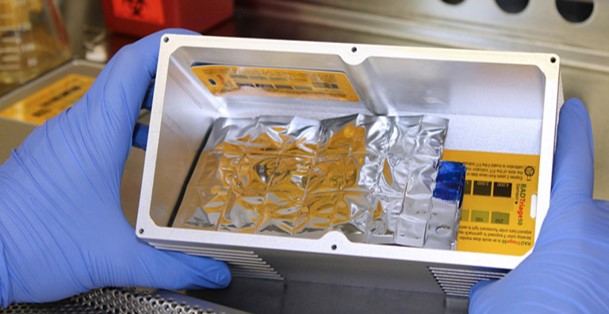Cosmic rays drop medicine from ISS, pose challenges for deep space missions – Advanced Science News
Cosmic rays destroy medicines such as ibuprofen, highlighting the need for new “space” medicines with modified ingredients.
Medicines can rapidly degrade when exposed to cosmic rays, according to new research published in the Advanced Healthcare Tools. This finding could be important for future deep space missions, where scientists and the equipment they need will be exposed to high levels of cosmic radiation for months or years at a time.
The research was carried out on the International Space Station (ISS) in parallel with laboratory experiments at the University of Adelaide in Australia.
On the ISS, ibuprofen tablets in aluminum blister packs are stored for about nine months in two different locations: the interior of the station and the International Space Station’s Multipurpose Experiment, the latter of which is the outer platform. exposed to harsh environments. outer space.
On Earth, ibuprofen tablets were exposed to atmospheric radiation for a short period of time at a high intensity to simulate “space-equivalent radiation”. Earth-based experiments have helped researchers understand the effects of single radiation sources on tablets.
The researchers found that the tablets sealed in an aluminum blister were almost protected from the effects of radiation while inside the space station. These findings are consistent with simulated laboratory experiments conducted on Earth. On the platform outside the ISS, however, the degradation was higher than 50%.
This finding is important because it could mean that similar destruction could occur on deep space missions to the Moon or Mars.
What happens to medicine in space?
Medicines are destroying the Earth, too, said Volker Hessel, professor of sustainable chemical engineering at the University of Adelaide, who wrote the study. The deterioration of medicine over time is the reason why products like ibuprofen have an expiration date. “We found in the atmosphere, this process is fast and “wild”, which means destructive products and toxic products,” said Hessel.
Medicines not only degrade, but also become dangerous substances. “We found 2-propionic acid which is known to cause skin irritation, severe eye irritation and difficulty breathing. It is toxic to certain target organs,” said Hessel. As another example, 4′-isobutyl-acetophenone was found to be neurotoxic with a toxicity 10 times higher than ibuprofen.
This doesn’t mean that astronauts can’t take ibuprofen or other medications on long spacewalks. Hessel and his co-authors also designed and systematically tested 19 levels of “space medicine” made of different compounds.

Ibuprofen tablets were coated with iron oxide to absorb some of the cosmic rays, helping to protect them from rapid degradation during flight. He said: “We thought that an ibuprofen tablet coated with iron oxide could cancel out cosmic rays, just like the higher levels of the atom do.” This was successful. Very little reduction was observed. “
The researchers also found that some of the creams added to the tablets removed or blocked the damaging molecules produced by the cosmic rays, which helped stop the deterioration.
“This is an important and timely study as the stability of medicine during space travel, especially long trips in deep space as those who go on a mission of 2-3 years to Mars, is something that is of great concern due to chemical breakdown by cosmic rays in a microgravity environment,” said Jacob Raber, a professor of behavioral neuroscience at Oregon Health & Science University, who was not involved in the study.
Raber has written research on how cosmic rays can affect astronauts during long journeys into deep space.
“Although it is an important step forward, the open question is whether ibuprofen with increased stability has the same clinical characteristics, pharmacokinetics and toxicological profiles,” said Raber. “Future animal studies with different species to test this seem warranted. Ideally, these drugs would be tested in animals exposed to space radiation and microgravity, as it can be assumed that drug responses may differ significantly in sham/control animals.
Looking ahead to water medicine in the future…
Hessel says the next steps in the research include examining the effects of cosmic rays on water chemistry. “Half of [ISS] medicine is taken by autoinjection, which requires a liquid medicine,” he said. Liquid products are less stable than tablets, Hessel said, in part because they are affected by microgravity as well as cosmic rays.
The effects of cosmic rays on medicine is a complex problem that may require individual solutions for individual drugs. Finally, it is possible that scientists on long journeys in deep space will need medicines that are very different from traditional medicine.
“Space medicine may contain different drugs and materials for the same purpose,” Hessel said. “We may have to develop ‘scratch’, site-specific drugs and therapies.”
Reference: Quy Don Tran, Volker Hessel, et al., Cosmic-Ray Radiation Effects on Ibuprofen Tablet Formulation Inside and Out of the International Space Station. Advanced Healthcare Devices (2024). DOI: 10.1002/adhm.202402361
Image credit: Volker Hessel et al
#Cosmic #rays #drop #medicine #ISS #pose #challenges #deep #space #missions #Advanced #Science #News